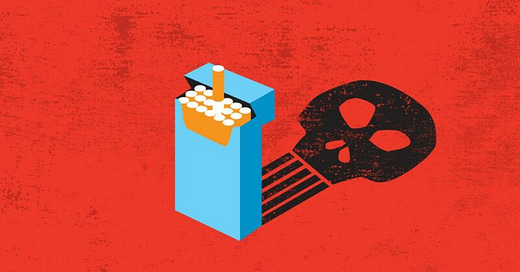How Cigarettes Affect Your Health
The only benefit of smoking cigarettes effects happens when you quit. When tobacco is lit on fire, it creates a chemical reaction that triggers more than 7,000 chemicals.
[Please note that this page contains affiliate links. If you choose to purchase after clicking a link, I may receive a commission at no extra cost to you.]
The only benefit of smoking cigarettes effects happens when you quit. When tobacco is lit on fire, it creates a chemical reaction that triggers more than 7,000 chemicals that contact your body's tissues.
How cigarettes affect your health from the moment the smoke enters your mouth, tar, a black material, starts to coat the teeth and gums, damaging the enamel, which leads to tooth decay. In addition, over time, smoke damages nerve endings in the nose, causing the person to lose their smell.
How Cigarettes Affect Your Health
Once the smoke reaches the airways and lungs, it dramatically increases the chances of infections and leads to diseases such as bronchitis and emphysema. Smoking does this by damaging the cilia – tiny hair-like structures whose job is to keep the airways clean. Then it fills the alveoli, which are tiny air sacks that allow the exchange of oxygen and carbon dioxide between the blood and lungs.
Although, cigarettes effects cause carbon monoxide to pass through the membrane and into the blood, binding to hemoglobin and displacing the oxygen it would have transported throughout the body. That is just one reason why smoking causes shortness of breath.
Within about 10 seconds, the blood carries a stimulant called nicotine to the brain, releasing dopamine, endorphins, and other neurotransmitters that give the users the pleasurable sensations that cause high addiction rates.
Nicotine and other cigarette smoke cause blood vessels and damage their delicate lining, restricting blood flow. These vascular effects lead to the thickening of blood vessels walls and enhance blood platelet stickiness increasing the likelihood that clots will form, leading to heart attacks and strokes.
Many of the chemicals from cigarettes can cause dangerous mutations in the body's DNA that create cancers. Additionally, ingredients like arsenic and nickel may disrupt the DNA repair system, thus compromising the body's ability to fight cancer.
One in three deaths from cancer was caused by cigarette smoke. But it is not just lung cancer. How cigarettes affect your health negatively is very apparent by the many cancers it causes, such as mouth, throat, nose, sinuses, esophagus, bladder, kidneys, ureteral, pancreas, stomach, liver, cervix, ovaries, colon, and blood.
Cigarettes effects can damage your eyesight and weaken your bones. In addition, it makes it harder for women to get pregnant, and in men, it can cause erectile dysfunction.
Benefits from Quitting Cigarettes
As soon as you quit smoking, there are immediate, long-lasting effects.
How cigarettes affect your health as soon as you quit:
Twenty minutes after quitting: heart rate and blood pressure start to normal.
Twelve hours after quitting: carbon monoxide levels stabilize as oxygen-carrying capacities go up.
After quitting, heart attack risks plummet as blood pressure and heart rates normalize.
Two days after quitting, the nerve ending responsible for smell and taste starts to recover.
Cigarettes effects after one month after quitting: lungs become healthier, with less coughing and less shortness of breath.
The cilia in the lungs begin to repair themselves in weeks and are fully restored like a newborn in nine months, improving resistance to infections.
At the one-year anniversary of quitting cigarettes, heart disease risk falls to 50% less likely as blood pressure improves dramatically.
Cigarettes effects after five years after quitting cigarettes: your risk of a clot dramatically declines, and the risk of stroke continues to go down.
Ten years after quitting: chances of lung cancer go down by 50% as the body's ability to repair DNA is fully restored.
Fifteen years after quitting cigarettes: the likelihood of heart disease is the same as that of a non-smoker.
Quitting is not fun and can lead to anxiety and depression, which are only short-lived with all the tools available to help people stop.
There is now nicotine gum, patches, sprays, and vapes that work by stimulating nicotine receptors in the brain, which reduces withdrawal symptoms.
Counselling, cognitive behaviour therapy (CBT), and group therapy can help people stay off cigarettes. In addition, moderate to high-intensity workouts is exceptionally beneficial to assisting people in staying off of cigarettes.
How cigarettes affect your health positively only can happen the moment you quit.




